KUALA LUMPUR, June 28 — It’s a little after half past two on a Tuesday in June, and Mohd Rizal bin Abu Bakar is very chatty.
The George Town, Penang native was talking to his business partner Nabilah Lee Lee Chong — in fluent Hokkien, no less.
Together, the duo run La Achee Porra, a Jawi Peranakan restaurant in the heart of downtown Kuala Lumpur.
The 52-year-old former floral designer traces his roots to Palembang, Indonesia as well as India.
“My grandmother is actually Indian Muslim, and there’s some Arab and things like that in there as well,” he says of his Jawi Peranakan heritage. “It’s a mixture of Malay, the Nusantara and also the Straits and things like that.”
But what, or who are the Jawi Peranakan?
“Jawi Peranakan are found mostly in Penang and Singapore, and the definition isn’t specified,” he explains. “Mostly Muslim traders from Iran, from India, Arabs, from Afghanistan and Pakistan and some are from Sumatra married to local Malays.”
Historically, they were an elite group in British Malaya. “They had a lot of big houses, mansions; they wore a lot of jewellery and gold at home. For them, it was nothing – it was a costume they must wear,” Rizal adds.
“You could call them golongan bangsawan. Their culture was very different; they were very lavish with their food and very orderly in the manner of serving — tertib, you know?”
Jawi Peranakan food is often regarded as a celebratory cuisine, typically served during big occasions, such as a wedding kenduri.
“It’s festive food, and the way we serve it is not like nasi kandar where all the dishes go on the rice,” Rizal explains. “It’s totally different; it’s actually by hidang, individual portions. You will have the chicken by itself, the dalca by itself, the korma, the daging — they will never be mixed.”
Still, there are few airs about the restaurant we are sitting in, where the food is self-service. But the golden plates in which a portion of nasi tomato arrives are perhaps a nod to the more ritzy customs of this underrepresented cuisine.
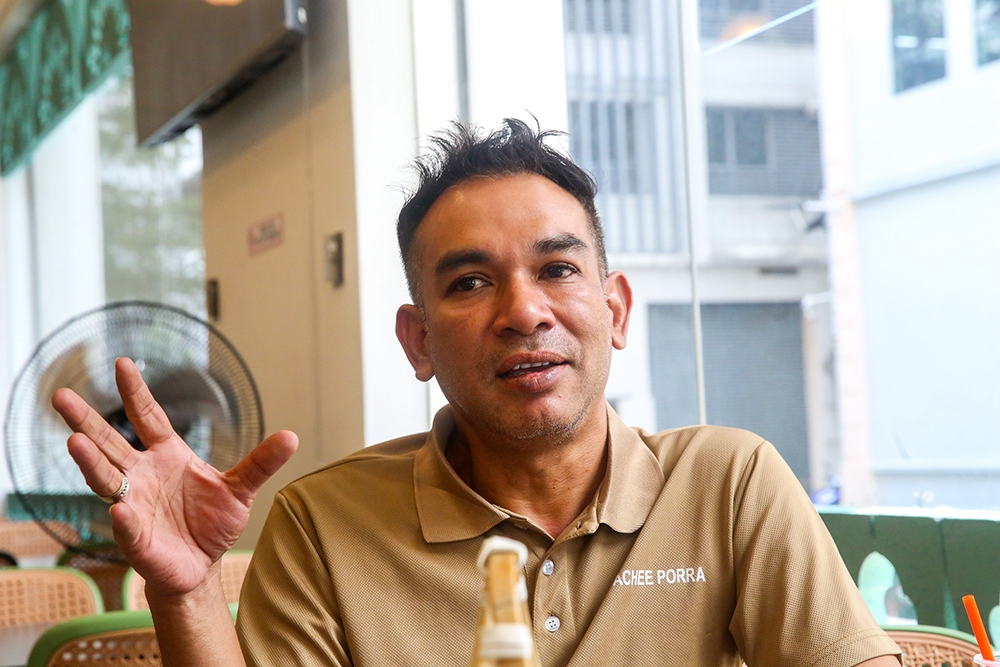
In Kuala Lumpur, there aren’t many restaurants where one might find nasi lemuni — light, fluffy rice, topped with cashews and honey-sweet sultana raisins, and dyed a dark purplish-green by the titular daun lemuni.
“A lot of people don’t know what Jawi Peranakan is; a lot of people think we’re an Italian restaurant because of the word 'La' in the name,” Rizal says, laughing.
“Some people think that we’re Baba Nyonya because of the word peranakan. It’s not really explained, but peranakan can mean something like adoption: you can be Baba Nyonya Peranakan, you can be Arabic Peranakan and things like that.”
Rizal likes to tell a simplified story in explaining Jawi Peranakan cuisine to new customers.
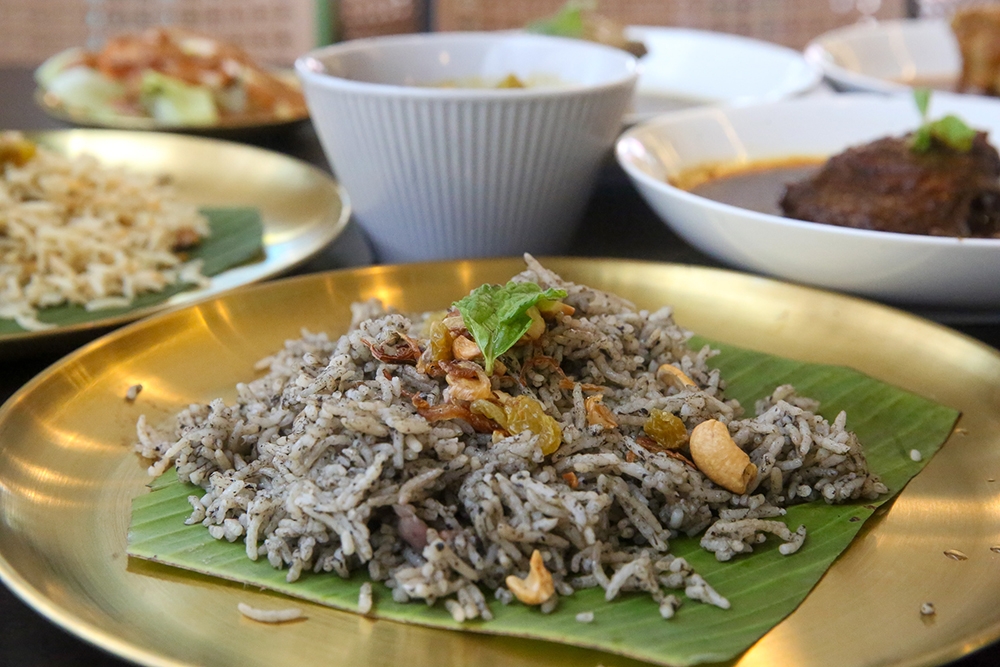
“Nobody wants to listen to blah, blah, blah, too long an explanation. I always explain to my customers in a very brief way: the Arabs or the Indian Muslims bring their spice; the wife wants to put serai and daun pandan.”
He pauses, almost theatrical in his delivery. “The husband will then say, ‘Put lah some cashew nuts. I don’t like the taste of coconut. Put almonds inside also, you can blend it — close one eye and it looks like coconut milk.’ So that’s how it was created!”
The story’s simple, but the reality is — as it often is — quite different.
Rizal is candid about the biggest challenge they face, which is introducing customers to the culture, and ultimately, helping customers develop an appreciation for the value of Jawi Peranakan cuisine.
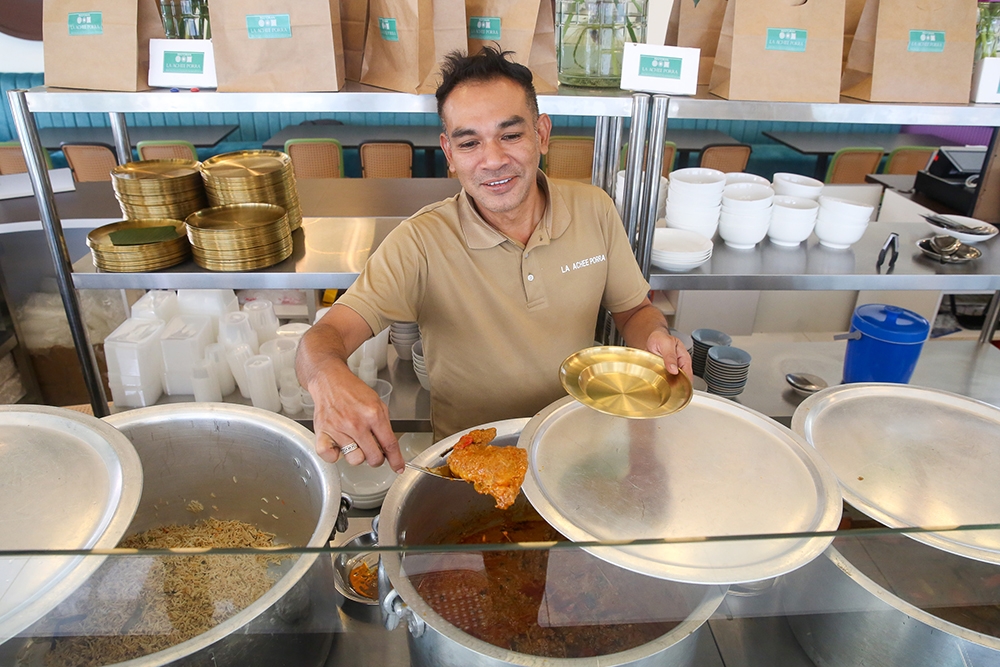
“It’s been around for centuries, but just not as popular as the Baba and Nyonya where the community is bigger,” he says, referring to the Jawi Peranakan community. “Sometimes people don’t even know that they are Jawi Peranakan, because they’ve moved around.”
Rizal wants people to see how tasty the food is but describes “making people understand the difference” as difficult. “I’m not saying my cooking is tasty; I’m saying it is the taste of difference, the taste of the olden days. It is the taste of many generations,” he adds.
Naturally, this attracts a certain type of customer. “We do have a crowd, more veteran I would say, who love the food,” he continues.
“I even have a customer who actually said, ‘I don’t have to go back to my mother’s house!’ I said don’t do that — please go back to your mother’s house. I’m not your mother!”
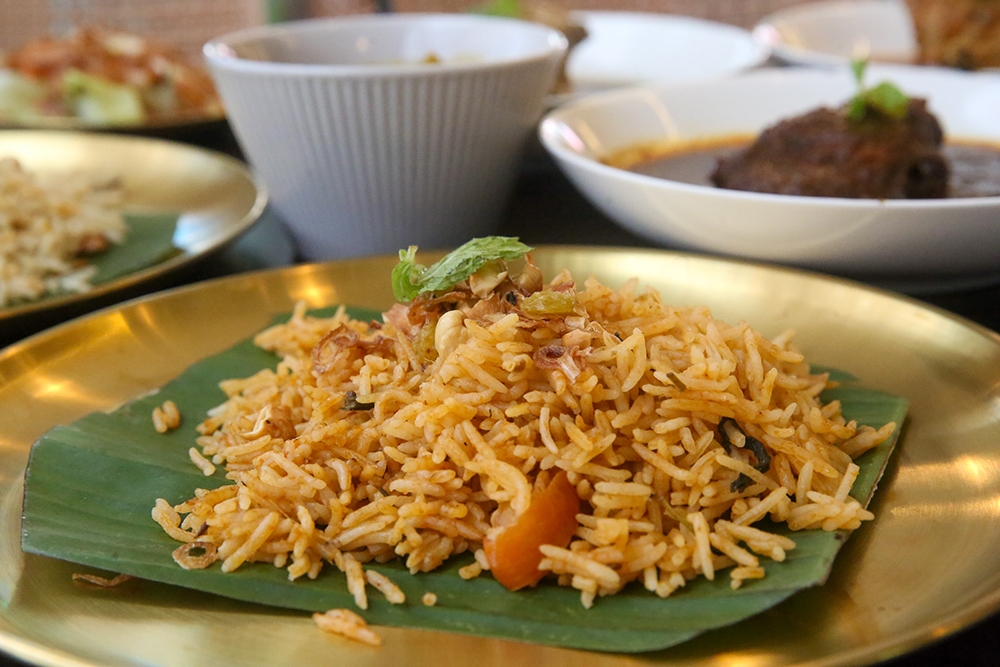
Perhaps slightly surprisingly, Rizal doesn’t consider sourcing ingredients to be a big challenge, even though almost all of his ingredients are sourced from Penang — including acar made the traditional way by an elderly supplier who works without a regular delivery schedule.
Instead, it is “helping people understand the value of the ingredients we use, and the effort that goes into cooking it” that he considers to be “the most challenging part”.
“In KL, people often associate nasi tomato with ayam masak merah, for as cheap as RM5 per pack,” he says. “But for us, our chicken (referring to their ayam cabai hidup) uses a lot of cashew nuts and almonds. And we use fresh chilli. If you compare cili boh and fresh chilli, of course, the costs are different.”
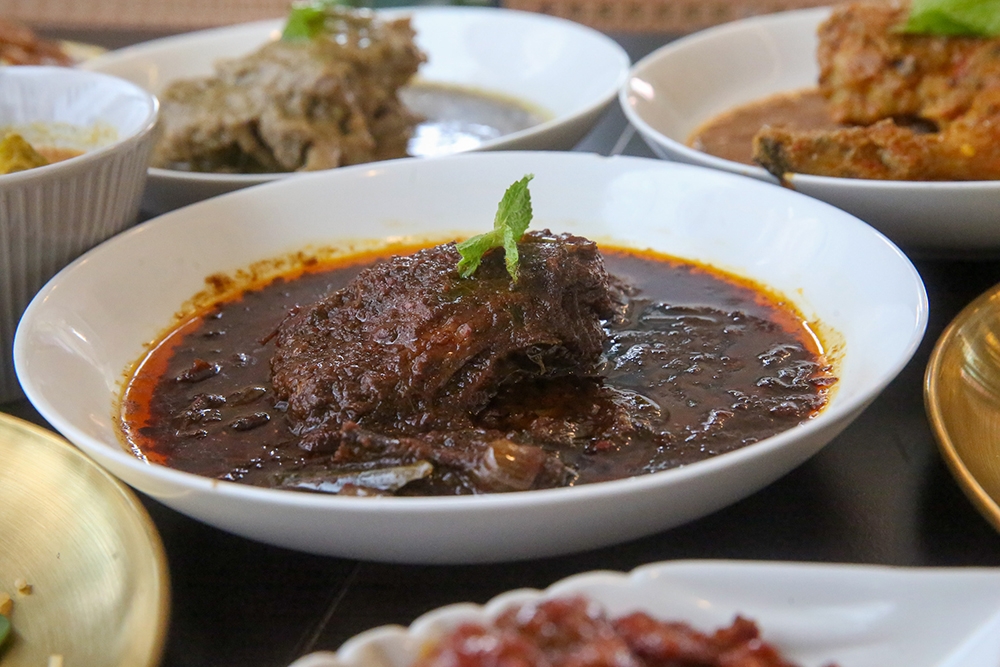
Rizal also mentions cooking with woodfire in large, seasoned pots worn by time to get the “authentic, old taste” before bringing the food to the restaurant.
Fire and safety regulations would not allow woodfire cooking in the building, so the food takes a journey to get here. “The process is tedious and costly; when the herbs and food have to take a highway, pay the toll, fill up petrol, that’s where the challenges are,” he explains.
“But we are happy to practise this in order to keep the quality and present the right taste.”
“Nasi tomato is one of our hot-selling items, and our daging masak hitam is actually the most in-demand item on the menu,” Rizal says.
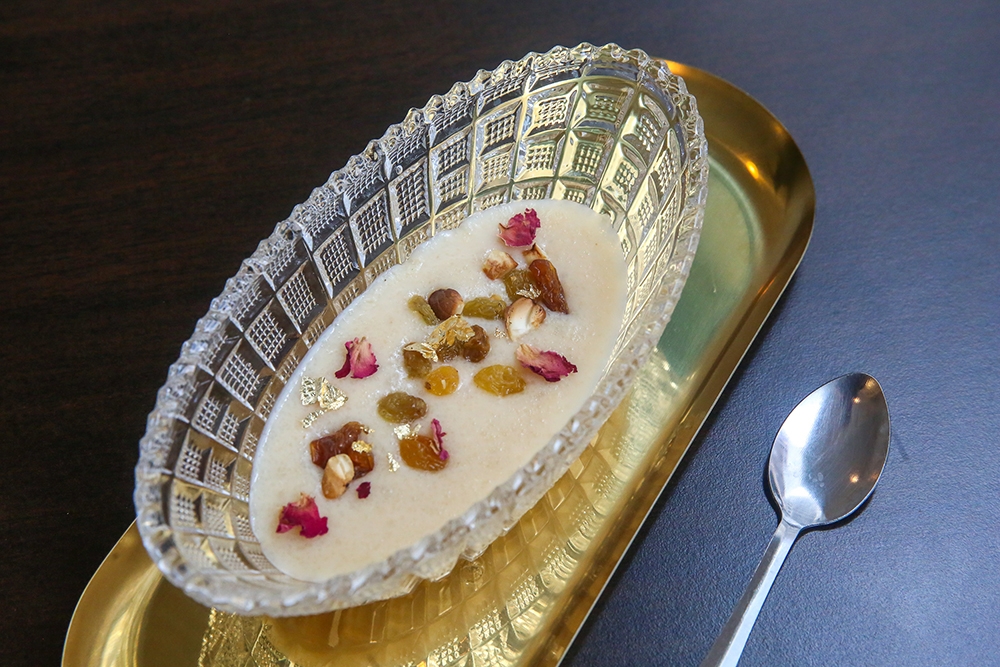
The former bursts with the distinctly tangy and slightly sweet flavour of tomatoes, while cashew nuts and sultana raisins bring a richer, sweeter depth to the rice.
The latter is a fork-tender hunk of beef braised into soothing submission in a rich medley of warming, woody aromatics. “People really like the sugee (bubur suji or semolina pudding). We cook it with rose water, orange blossom water and of course, pandan,” he adds, before pulling out more theatrics.
“You just imagine three fragrances: Calvin Klein, Christian Dior and Chanel. You know, when you walk,” he says, taking a loud, deep breath, “you get asked ‘What perfume do you use sir?’ I can’t remember! Then we put Armani on top with gold flakes.” I can’t speak for the three kings and one queen of fashion, but the sugee is certainly every bit as elegant and fragrant as one would expect — and even surprisingly light.
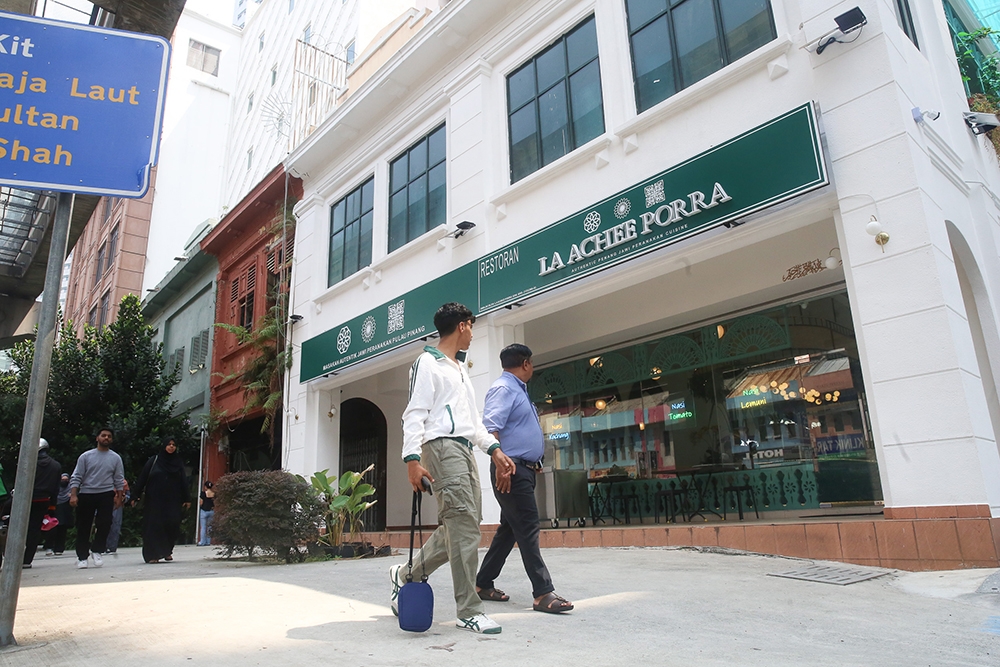
Ultimately, Rizal believes that the food remains the best way to get a glimpse into Jawi Peranakan culture. “When you eat and we explain to you, it brings you — for a moment — to Penang, to the olden days, you cruise around Penang Road, then to Chowrasta Market; when you pay at the cashier counter you are back to your wallet,” he laughs.
“Because the Jawi Peranakan manner of serving food, we are not stingy; it will always come with a dessert. It’s like whenever you finish a kenduri at one house, you will definitely want to go back home and rest. It’s not because you are tired; it’s because you are full.”
La Achee Porra
G & 1st Floor, Wisma Tancom, 326-328, Jalan Tuanku Abdul Rahman 50100 Kuala Lumpur, Malaysia
Open Monday to Saturday, 11am-10pm.
Tel: 013-797 0814
Facebook: @LaAcheePorra
Instagram: @la_achee_porra
* Follow us on Instagram @eatdrinkmm for more food gems.






















